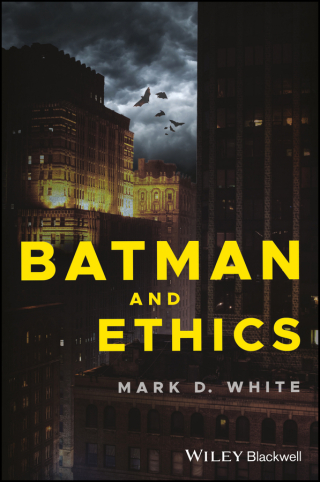 The news is out! As announced in the "Batman's Brain" panel at San Diego Comic-Con and in an interview with CGTN America, the superhero-and-philosophy book I've been teasing for the last few months is titled Batman and Ethics and will be published by Wiley Blackwell next spring!
The news is out! As announced in the "Batman's Brain" panel at San Diego Comic-Con and in an interview with CGTN America, the superhero-and-philosophy book I've been teasing for the last few months is titled Batman and Ethics and will be published by Wiley Blackwell next spring!
Following the same approach I used in The Virtues of Captain America, Batman and Ethics breaks down the Dark Knight's moral code by looking at his actions and words over four decades of comics, from the early 1970s to 2011. By restricting myself to a period of (only) the comics in which I believe the character was portrayed fairly consistently, starting with Denny O'Neil and Neal Adams' legendary work and ending just before the New 52 relaunch, I try to show that Batman's moral behavior shows a deeply conflicted hero, one who tries to save lives and serve justice in several different ways but has trouble finding an acceptable balance between them—or even within any one goal. Instead, his actions and words reflect a mix of utilitarianism and deontology (with just a touch of virtue ethics) that reveals the value of each while demonstrating how difficult it is to pursue them at the same time.
The first half of the book covers the nature of his mission while the second half discusses what he will do—and will not do—to further it. In the process, I talk about issues such as:
1) Why does Batman refuse to kill even his most murderous villains even though that would contribute significantly to his self-professed goal of saving lives? (I discussed this in the first chapter of my 2008 co-edited book Batman and Philosophy, but I go much deeper into it here, including an extended ride on everyone's favorite trolley!)
2) How does Batman reconcile his widespread use of violence and torture with his mission—especially given that he often wields these tools against people who are not even suspected of committing crimes—and how do these actions compare with killing, which he refuses to do?
3) How does Batman choose which crimes to investigate or which criminals to pursue, and why does he give some a pass (such as a certain feline foe of whom he's famously fond)?
4) How can we explain Batman's often tenuous relationship with the Gotham City Police Department and his close friendship with Commissioner James Gordon—and how does all of this affect the pursuit and conduct of criminal justice in Gotham overall?
5) Why does Batman continue to train young boys to be his sidekicks when even he admits it's… problematic?
6) Is being Batman the best way Bruce Wayne can serve his mission of saving Gotham—and even if not, is it within his rights to do so? (And speaking of which, is it OK that he focuses so much on Gotham to the exclusion of the rest of the world?)
7) More generally, is Batman of value—to Gotham, to the world, and to Wayne himself?
Do these tough challenges suggest that Batman is any less of a hero or a good person? Not at all! If anything, it shows that he tries too hard to do too much along too many dimensions, setting himself up for failure to succeed at any one of them. But that's part of what makes Batman a fascinating character: he pushes himself harder than anyone can, holds himself to impossible standards, and beats himself up when he fails to live up to them.
It's also part of what him relatable, because most of us are morally conflicted in the same way. We all want to do what's good and we also want to do what's right, but we don't always have a clear idea what either of those means, much less how to settle conflicts between them. By looking at Batman's moral inconsistency, then, we might get a better picture of our own, and see how we might work on improving it.
Watch this space for more news about Batman and Ethics as the release date approaches!
Leave a comment